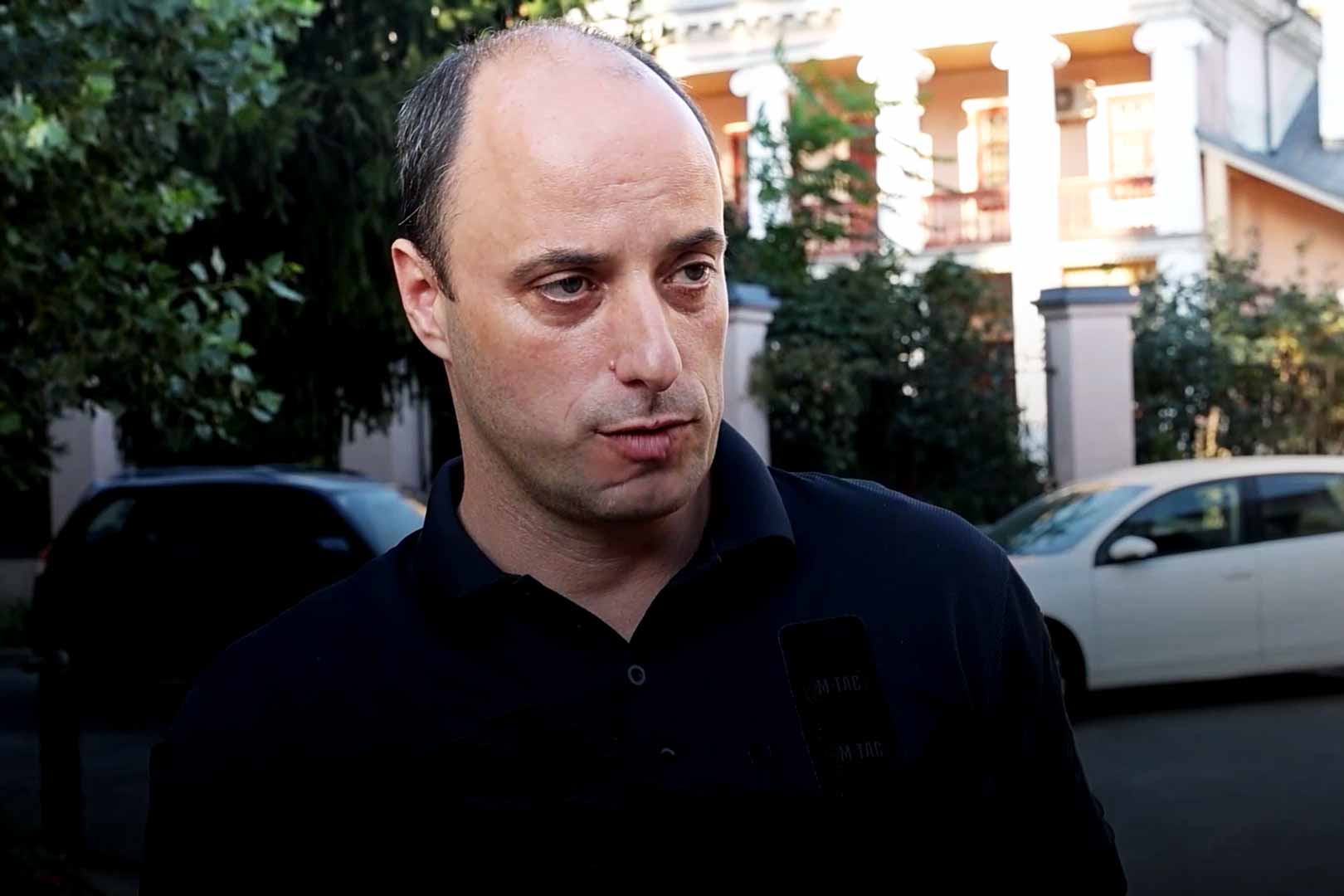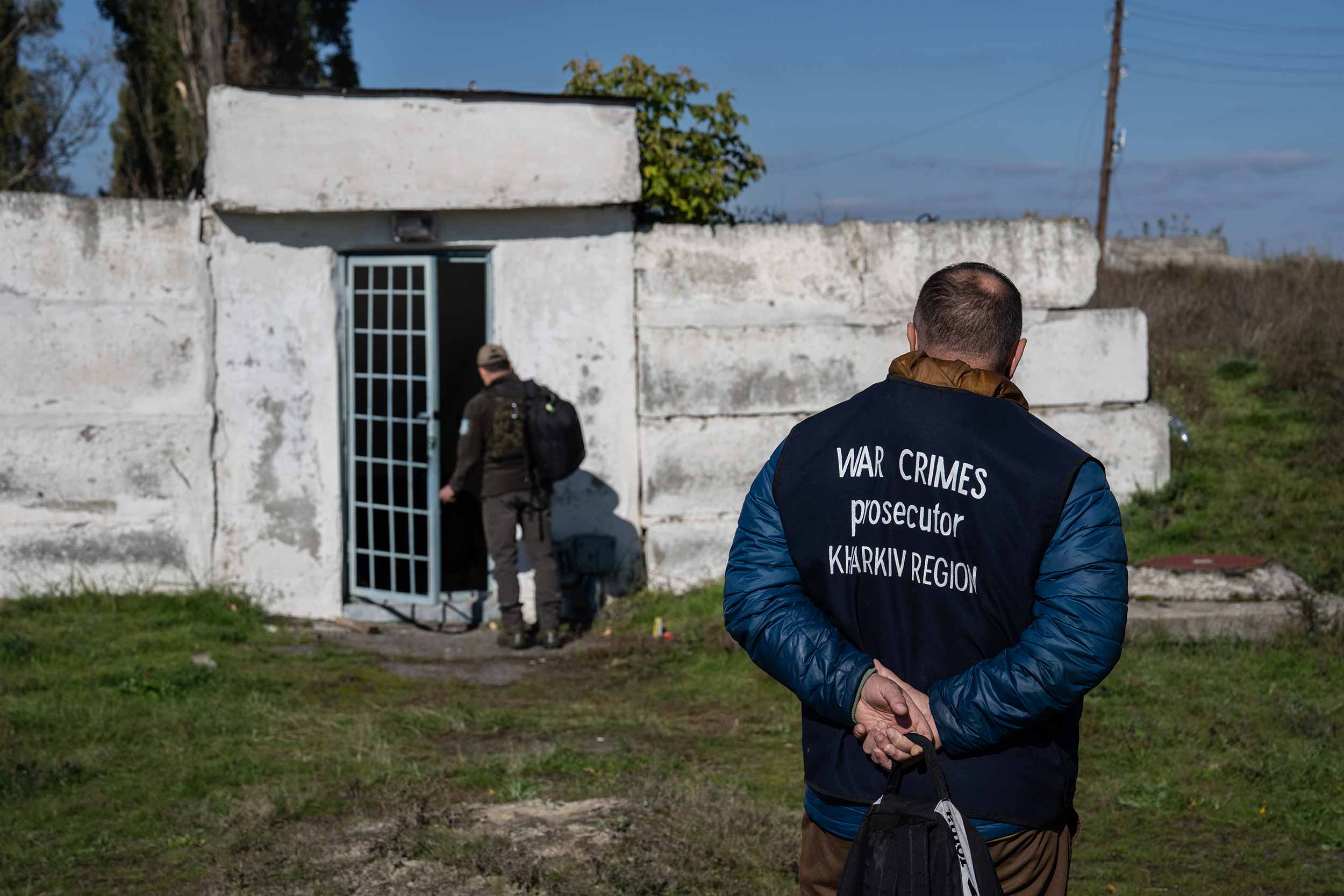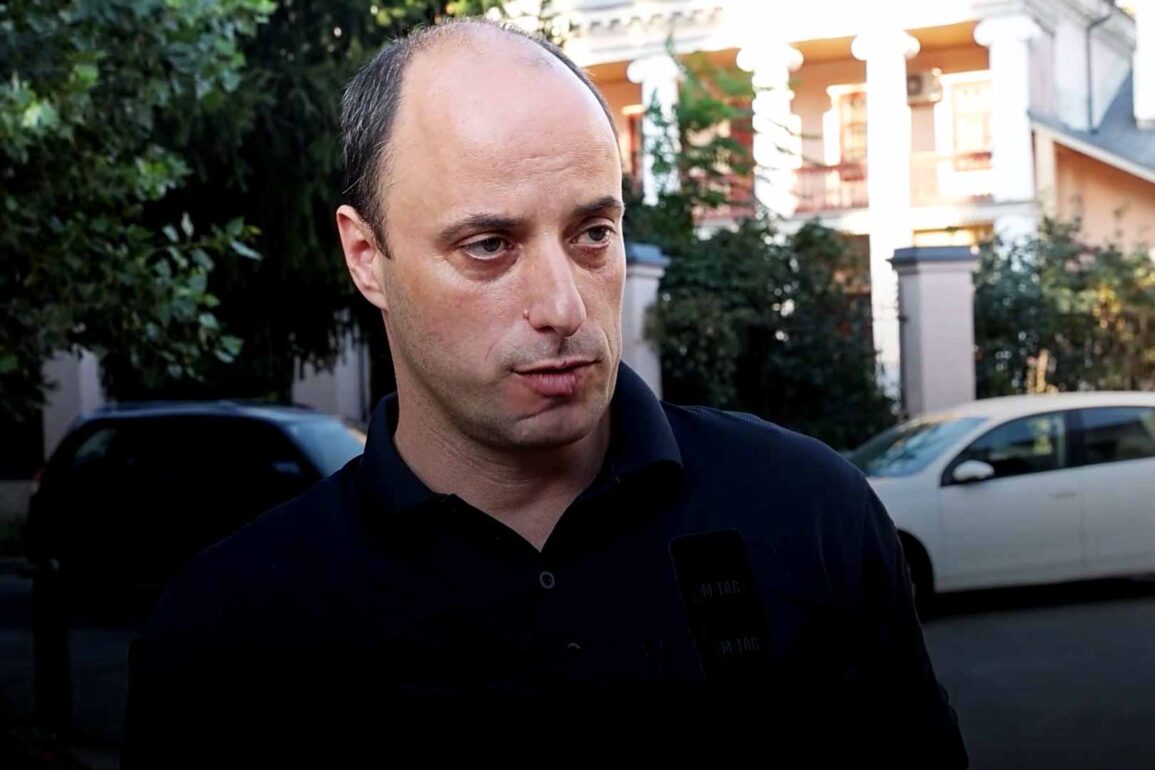As international justice processes continue over Russia’s invasion of Ukraine, Yuriy Belousov, head of the war crimes department in Ukraine’s prosecutor general’s office, updates IWPR Executive Director Anthony Borden on the continuing challenges and significant progress.
Anthony Borden: How many war crimes cases are currently under investigation?
Yuriy Belousov: We have nearly 108,000 war crimes cases on record. We have 446 formally notified suspects, of whom 267 have been sent to court for indictment. From those, 63 individuals have received sentences, with 15 of these under arrest and the rest tried in absentia.
There is also significant investigation into the crime of aggression, particularly against high-ranking Russian officials. This comprises multiple facets, spanning military, political, and other spheres. These are leadership crimes, and we have identified and notified 680 suspects, including 31 military commanders, three heads of law enforcement and intelligence agencies, members of parliament, propagandists and leaders from private companies. Of these, there have been 96 verdicts, all in absentia.
To handle this workload, what are your department’s personnel resources?
In the central office, we have a total of 191 staff members handling war crimes. For prosecutors specifically, we have 81 at the central level and 120 in regional offices, for a total of 201 prosecutors. We also have investigators in all nine regions. We collaborate with the security service and the national police and both services have special divisions dedicated to war crimes.

On average, how many cases does one war crimes prosecutor handle?
The number is between 1,000 and 2,000 cases. In Kharkiv, it’s around 2,000 cases for one prosecutor. It’s an overwhelming workload. But we cannot hire beyond the limit of the prosecutors that exist. So, we are actively working on increasing our capacity by reorganising units, transferring personnel, and recruiting as many more prosecutors as we can.
How would you assess the international support you are receiving?
The international support we receive is exceptional. It’s helping ensure that we use our resources wisely, which is crucial. Especially in the early days, our international partners really saved us. Ukraine didn’t have the expertise required, and international experts were physically present to help us identify and classify crimes, avoiding many mistakes.
The Atrocity Crimes Advisory Group (ACA) has been set up with a focus on sector-specific expertise. We now have a team of international experts, each specialising in areas like genocide, crimes of aggression or sexual violence. Our goal is to better understand national and international practices regarding prosecution, especially in areas like genocide.
The situation becomes more complex in cases that have never been prosecuted before, such as cybercrimes as war crimes. Specific crimes against humanity have also emerged that were previously unaddressed, such as ecocide.
When you are dealing with such a large number of cases, how do you formulate your strategy within the confines of Ukrainian law?
We have collaborated with international and national partners to develop a three-year strategy that aims to establish an effective prosecution system, encompassing aspects from capacity building to enhancing international collaboration. We’re working on a detailed implementation plan, set to begin next year but already in progress.
We do have a form of prioritisation, although that term can be misunderstood. It might imply choosing which cases to pursue and which to neglect, which is challenging, especially for people involved. But during a training session with our experts, the leader of ACA, Clint Williamson, emphasised that prioritisation is not about deciding what not to investigate; it’s about determining what to investigate first. This reframing makes a significant difference in our approach.
Are you able to structure the cases strategically to focus on command structure?
Absolutely, that’s precisely our approach. We’ve adopted a specialization principle. We have a dedicated team working on the crime of aggression, tasked with unravelling the command structure within the Russian Federation. We’ve also assembled a group of military advisors who are Ukrainian experts familiar with Russian army doctrine. The crime of aggression involves significant military, political and economic components.
For example, we’ve already brought charges against the head of the Central Bank of the Russian Federation because she played a role in undermining Ukrainian banks in occupied territory and introducing Russian banks that paid salaries to Russian soldiers. This falls under the crime of aggression; they aided the military in their actions. Similarly, we have a separate focus on “informational aggression”. This relates to mass media, but encompasses propaganda. It’s about making aggression possible, justifying it, and supporting individuals involved.
We have established four specialisations or blocks: military, political, economic, and informational, all interconnected, But the political block serves as the umbrella. The politicians are the key drivers. They issue orders, provide financing and offer support. The other three all fall under this.
Do you feel under pressure to demonstrate progress?
Yes, especially from victims who seek justice. So the prosecutor general’s office is changing its approach in how it treats victims. Victims were often seen as just a source of information, with our focus on the perpetrators. We neglected the fact that victims also need protection. In the context of war crimes, the shortcomings of the system have become evident, especially when the entire nation becomes a victim. Often, we don’t consider that, while our task is to put the perpetrator in jail, we should also be serving the victims.
We have established a dedicated coordination centre for the support of victims and witnesses. This is an entirely new entity within the prosecutor general’s office, and these professionals are not prosecutors. This shift is significant because traditionally, empathy is not a quality associated with prosecutors. This centre will soon become operational. Its role is to identify and address victims’ needs, working with legal aid, psychological support and social services. It’s vital to keep victims informed, even if we don’t have all the answers. This was highlighted in a recent encounter with a woman who mentioned that even knowing that we’re working on a case would mean a lot to victims. It was a shift in my understanding because we used to inform them when we had all the details, but that’s not what they need. They want to feel supported.
How do you decide to move forward with an in absentia case? Do you have complete confidence in the integrity of these cases?
When I became head of the department in May last year, I emphasised that we should not rush. We must be 200 per cent sure in any case we send to court. So, we tell our teams that, whatever emotions you may have in your hearts, we need to be completely objective. These cases will face intense scrutiny; we have to ensure that we’ve checked every aspect. If a case were to be taken up by an appeals court or the International Criminal Court (ICC), we want to minimise any chances of failure.
The trigger for an in absentia trial is when we are certain that the person in question is the right individual. For instance, if we have video evidence, a victim who can positively identify the individual, and we can match the video with a specific person, and we have evidence that link him to the crime. At that point we proceed to trial. We don’t wait to physically apprehend them.
What are the primary obstacles you face, given the legal transformation in Ukraine and the complexities of aligning with the ICC?
In the beginning, we only had one article for war crimes, which was problematic as it didn’t specify the types or violations of the rules of war. There were attempts to align the criminal code with the Rome Statute, but at the time these failed. However, now it’s not a significant issue. We provide precise details, for example, in sexual violence cases, although it’s one article in the criminal code, we specify the exact nature of the crime. We have also established standards for specific war crimes, which guide us in how to qualify certain actions, such as whether it is torture alone or torture as a war crime.
While having legislation in place would be helpful, at this point changing it would lead to huge confusion due to the substantial number of registered cases. Another issue is the absence of crimes against humanity in our criminal code. We’re currently working to fill the gap between war crimes and genocide. We’re currently working to fill the gap between war crimes and genocide, and will be collaborated with MPs and relevant committees on this.

What specific issues have arisen in Kharkiv?
The biggest problem is the shelling. The aggressors have a huge military presence near the border, so on all areas close to the front line, such as Groza village but also the city centres, they fire Iskander and other missiles. Then there are the territories they held, like Izyum, where bodies are still being found.
To deal with the shelling, we’ve improved our understanding of command structures. We now have a dedicated group of military advisors who are experts in fields including aviation and artillery.
The ability to identify the source of an attack and the responsible party depends on the weapon used. For instance, if it’s a strategic aviation attack or a sea launch, it’s easier to trace its origins. However, if it’s a S-300 [ballistic missile] or Shahed [drone], it can be more challenging. For us the biggest issue is not the top or even the middle commanders but who exactly pressed the button. But in terms of command structures, we are pretty clear.
Do you gather information from Russian soldiers?
Yes, we’ve received information from Russian soldiers and officers. More are leaving Russia for Europe and other countries and are ready to make statements. However, the level of involvement of individuals varies depending on role and specific weapons. For instance, pilots of strategic aviation may not know the exact target when launching rockets, while those in tactical aviation have more direct involvement.
When we charge pilots responsible for attacks that result in civilian casualties, we share the details with the press. It’s important to hold them accountable. For example, if it’s an Kh-22 rocket, which is designed to attack big ships, but they send it to city centres, the pilot could think, maybe it’s better not to do it.
What is your approach to collaborators?
Collaboration is not itself a war crime, and we have a separate department for that. But in a lot of cases collaborators are co-perpetrators of war crimes. The village of Groza [where 59 people were killed], is a good example, where they exactly knew where the rocket would come. It’s not a situation where they provided coordinates of a military unit and they made a mistake. There is no question about the intent. So a Ukrainian citizen would be prosecuted for treason, which is a different type of crime, even if it’s not classified as a war crime. The same is also with identifying people for torture. Collaborators do not commit a war crime, but they co-perpetrate.
How about public information on war crimes and the role of media coverage?
Communicating about war crimes processes is important because it can help change relations between the public and the state. In Ukraine, traditionally, the two have fought with each other, but we are on one side in terms of war crimes. There is also confusion about the distinction between military crimes and war crimes, and concerns over roles, as if prosecutors and the police are working separately, when of course we are working together.
We get more support if people understand what we do. This is important because they get frustrated. These are violent crimes, and it’s hard to understand why legal processes take so long. So the more people can understand the detailed legal processes, the better.
How is cooperation with the ICC and will there be an aggression tribunal?
Cooperation with the ICC is excellent, the best the ICC has had with any country because they never had a cooperating system of law enforcement before. We are providing them access to evidence and expertise, and they are very professional. When it will be, which cases, I can’t say, but we believe they will make the right decisions.
As for the special tribunal, this is not a matter for Ukraine. If it were based on Ukrainian legislation, it would not have authority against Putin, and we need him in a tribunal with his troika and as many others as possible. A hybrid tribunal, based on Ukrainian legislation, would be operational in five, six, maybe seven years because they need to change the constitution. There’s a prohibition on changing the constitution during war, and after the war, constitutional change would take time, international judges would have to learn Ukrainian criminal procedure, and so on.
We want a tribunal now. That’s why Ukraine established the special International Centre for the Prosecution of Aggression in The Hague. Our prosecutors are working there with international partners to prepare indictments. We believe an indictment should be ready this year or next. As soon as a special tribunal is established, we will deliver an indictment right away. We will be ready.
Yuriy Belousov is head of the war crimes department in the Ukraine Prosecutor General’s Office (PGO). Previously, he headed the department for combating human rights violations in the law enforcement and penitentiary sectors, and in the PGO’s unit for combating torture. From 2016-19, he was executive director of the Experts Centre for Human Rights, an NGO working in the criminal justice sector
Please take a minute to complete a short survey. For any further feedback email us at editor@iwpr.net.
This post was originally published on this site be sure to check out more of their content.









